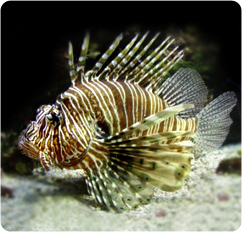|
Mark Martin on Weaning Lionfish
Mark Martin is Director of Marine Ornamental Research at Blue Zoo
 |
| Volitan Lionfish Can be Difficult to Wean Onto a Captive Diet |
This week we are offering a fantastic deal on lionfishes from Vietnam, and so I wanted to use this week’s tip to help new lionfish keepers with some tips and tricks they can use to wean their animals onto a captive diet. While I am specifically talking about lionfishes here, keep in mind that this approach will work for many fishes that will not readily accept a captive diet.
Lionfishes are wonderful aquarium fishes that can be quite hardy and long-lived IF the aquarist can get them to eat. Otherwise, hunger leads to stress and stress leads to a weakened immune system opening the fish up to disease and parasitic infestations. If disease, infection or infestation doesn’t kill the fish, than starvation eventually will. In short, if you can’t get your new fish to eat, it’s not going to survive.
For many finicky eaters, live food is the trick. Whether live food prompts an instinctual feeding response or whether it simply “smells better,” offering a new fish live food is sometimes the only way you will get it to eat. For many aquarist, however, continuing to feed live food is something they are not set-up to do either in terms of time or equipment. For this reason, it is desirable for most aquarist to get all their fishes eating a varied captive diet including commercially available frozen, flake and/or pellet food. This is usually supplemented with marine flesh (e.g., table shrimp) and a herbivorous option like Nori (seaweed). But how do you get your lionfish that won’t pay any attention to the commercially available foods you offer it to readily eat anything you put in the tank?
Patience.
No, really. It take a lot of patience, but the end result is almost always worth it. The first step is choosing the proper live food. For lionfishes, I like to start with ghost shrimp. Ghost shrimp, sometimes called glass shrimp or grass shrimp, are actually one of several species of closely related shrimp from the family Palaemonidae and are commonly available at your local fish store. I like to “gut-load” ghost shrimp by feeding them a product like Cyclop-eeze at least eight hours before offering them to the lionfish. I have rarely seen a lionfish (or any other fish for that matter) turn down a meal of live, gut-loaded ghost shrimp.
Once you have your lionfish eagerly eating ghost shrimp, it’s time to start mixing the ghost shrimp with frozen mysis shrimp. If you have never purchased frozen mysis shrimp before, now would be a good time. This is undoubtedly the most nutritious frozen food commonly available to the aquarist. The reason for this is that mysis shrimp are loaded with fatty acids and are protein rich. Over time (days to weeks depending on the individual fish), increase the frozen mysis shrimp and decrease the ghost shrimp until you have cut out the live food entirely.
Using this technique, every lionfish should be able to be weaned onto a captive diet including fresh or frozen foods such as krill, shrimp, silversides, and various prepared foods. Once the lionfish is settled in, offer food on a feeding stick, but don’t force the issue. Feeding one to three times a week should be sufficient.
If you have a question you would like answered in my weekly “Ask Mark” column, please e-mail me at mark@bluezooaquatics.com. To see all of the past “Ask Mark” tips, please visit the Blue Zoo Aquatics Resources page.
Published 25 August 2008. © Blue Zoo Aquatics
|